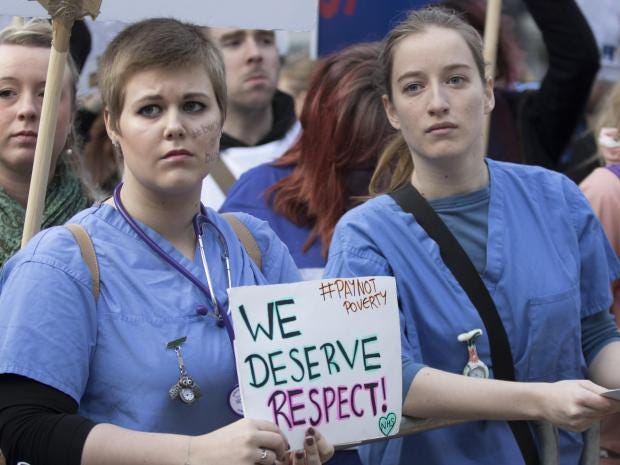The NHS is struggling to attract new staff because of poor rates of pay (thanks to a pay cap) and now the British Medical Association says 42% of the 30,000 EU-qualified NHS doctors are consider leaving the UK as a result of Brexit.
The diminishing attraction of working in the NHS is at partly because of the 1% annual cap on public sector pay increases introduced in 2010, which the Royal College of Nurses says translates to a 14% pay cut in real terms.
Jeremy Corbyn failed in an attempt to remove the cap in a House of Commons vote following the Queen’s Speech, which set out the priorities of Theresa May’s minority government for the next two years. Despite being celebrated by the public and politicians alike the NHS is no longer an attractive employer and working for it risks becoming an act of charity rather than a way to earn a good living.
In 2016 the Public Accounts Committee said NHS England had 50,000 fewer front-line staff than it needed, which was about 6% of the total NHS workforce.
Why was it introduced?
 Seven years ago public sector pay had been through a brief period of rising more than private sector pay and capping such rises was a way to cut costs as part of the Cameron Government’s austerity drive. However a Government response to a 2015 Change.org petition to end the cap said that public sector wages were on average comparable to those in the private sector, and that public sector workers “continue to benefit from a premium once employer pension contributions are taken into account.”
Seven years ago public sector pay had been through a brief period of rising more than private sector pay and capping such rises was a way to cut costs as part of the Cameron Government’s austerity drive. However a Government response to a 2015 Change.org petition to end the cap said that public sector wages were on average comparable to those in the private sector, and that public sector workers “continue to benefit from a premium once employer pension contributions are taken into account.”
“Pay restraint is one of the difficult decisions the Government has had to make to help put the UK’s public finances back on track,” it said. “There is a trade-off between pay and jobs in many public services, and at a time when further spending reductions are required to finish the job of fixing the public finances, a tough pay award policy makes a significant contribution in protecting jobs and maintaining public services.”
But the Government’s intention to maintain the cap for a decade was sure to take its toll on the living standards of NHS workers.
Former Tory MP Gavin Barwell, who lost his seat in Croydon Central at the general election and was promptly appointed as Theresa May’s chief of staff, has spoken about how a teacher viewed the cap as a necessary measure that has now been overstretched. “There’s a conversation I particularly remember with a teacher who had voted for me in 2010 and 2015 and said ‘you know I understand the need for a pay freeze for a few years to deal with the deficit but you’re now asking for that to go on potentially for 10 or 11 years and that’s too much’,” Barwell told the BBC.
Unsustainable?
 Seven years after the cap was introduced it is becoming more widely accepted that continuing such restraint would be both unfair and a strategic mistake amid worrying inflation rates and the need to make the NHS a more attractive employer as a result of Brexit and the likely loss of many EU staff.
Seven years after the cap was introduced it is becoming more widely accepted that continuing such restraint would be both unfair and a strategic mistake amid worrying inflation rates and the need to make the NHS a more attractive employer as a result of Brexit and the likely loss of many EU staff.
“Pay is becoming uncompetitive,” says Chris Hopson, the chief executive of NHS Providers, which represents hospitals and other health service providers. “Significant numbers of trusts say lower-paid staff are leaving to stack shelves in supermarkets rather than carry on working in the NHS.”
This is not a hard-Left trade union point of view but a very real issue of attracting and retaining high-quality staff. Stephen Dorrell, a health secretary in John Major’s government says health employers want to see the cap lifted “so they can compete for and retain the commitment of high quality staff and deliver high-quality healthcare.”
While Labour promised to abolish the cap in favour of a living wage in its 2017 election manifesto neither the Conservatives nor the Lib Dems offered to do the same.
By Stewart Vickers @VickHellfire
The post Brexit: The NHS Pay Cap Must End appeared first on Felix Magazine.
No comments:
Post a Comment